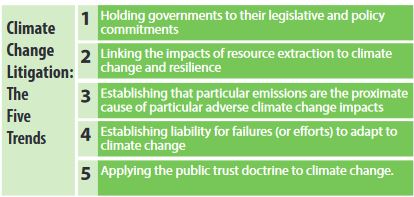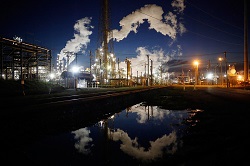- If you can’t beat them, sue them. Citizens are increasingly taking governments to court over climate change inaction, with financial lenders – and possibly big firms – next in the firing line.
Some 894 climate change cases have now been filed in 24 countries, according to a report published last week by the United Nations Environment Programme and Columbia Law School’s Sabin Center for Climate Change Law in New York.
By some distance, most – 654 – have been in the US. Australia sits in second place, with 80 cases, and the UK third, with 49. The number of countries with climate cases has tripled since 2014.
The report is here.
They find that the five trends of climate change litigation are as follows:

Emerging issues include “climate change refugees” who are not covered by the international refugee convention, plus an increase in litigation in developing countries, where there are very few at present.
The Sabin Center for Climate Change Law has a Climate Law Blog which has a post on the global review of The Status of Climate Change Litigation. It summarises the trends thus:
- Citizens and non-governmental organizations are suing to hold their governments accountable for climate-related commitments. In many instances, the arguments made to challenge government actions or inaction include reference to constitutional and statutory provisions not specific to climate change.
- Many challenges to a project or policy identify legally significant linkages between resource extraction and climate-related impacts, both in the form of emissions due to combustion of extracted fossil fuels and in the form of impairments to resiliency and adaptive capacity.
- Building on scientific understanding of the relationship between emissions and climate change, several cases seek to establish liability for entities that generate emissions with full knowledge of those emissions’ effects on the global climate.
- Steady improvements to the technical understanding of climate change and future temperature and weather patterns provide a strengthening basis for claims that seek to assign responsibility where failures to adapt result in foreseeable, material harms.
- Litigants are arguing for climate action based on the public trust doctrine, which assigns the state responsibility for the integrity of a nation’s public trust resources for future generations.
- More and more cases can be expected to arise as a result of growing rates of migration within and across national borders due to both slow-developing and acute environmental stresses.
- Litigants and courts in the Global South are beginning to make use of burgeoning climate change litigation theories and know how.
I’ve used bold to highlight the main point in each case.
The report cites many examples, for instance the Dutch environmental group, the Urgenda Foundation, and 900 Dutch citizens mounted a successful action against the Dutch government. As a result the court ordered the government to limit GHG emissions to 25% below 1990 levels by 2020, finding the government’s existing pledge to reduce emissions 17% insufficient to meet the state’s fair contribution toward the Paris Agreement.
The Sabin Center site includes links to two climate change litigation databases comprising:
- two comprehensive databases of climate change caselaw. Cases in the databases are organized by type of claim and are searchable. In many cases, links are available to decisions, complaints, and other case documents.
Lethal Heating has a reprint of a Toronto Star article Could Governments And Oil Companies Get Sued For Inaction On Climate Change? with a long list of earlier reprints on the topic at the end of the post.
In February there was a one-day conference at Murdoch University on how legal action will change environmental law.
In March Tessa Khan wrote in The Guardian How climate change battles are increasingly being fought, and won, in court. One of the cases was:
- a groundbreaking climate case decided last month in Austria. A federal court blocked the expansion of Vienna’s international airport because the increase in carbon emissions that a new runway would generate is inconsistent with Austria’s commitments to tackle climate change.
Also:
- In Pakistan, where rising temperatures are already threatening lives and livelihoods, a court found in favour of a farmer who argued that his rights to life and dignity were under threat because of the government’s inadequate climate change policy.
It is said that one of the reasons Trump initiated withdrawal from the Paris Agreement was to avoid litigation. Governments and other entities will increasingly have to be mindful of litigation possibilities. I’ve included the Climate Law Blog on the Selected Climate Sites page.


This is all good news.